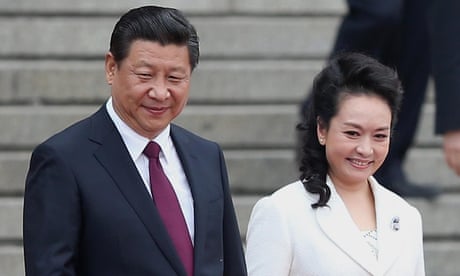Steel yourself, for an unlikely source is about to spout a highly unfashionable idea. This week, George Osborne will come out for renationalisation.
You won’t hear the N-word from his lips, of course. Nor shall the chancellor go full Corbyn and seize some of the FTSE’s crown jewels. Instead, you can expect something far more in keeping with the spirit of 21st-century Britain. The government will indeed put some of our most vital infrastructure under state control – but the states in question will be France and China.
At some point during this week’s visit of president Xi Jinping – perhaps sandwiched between lunch at the palace and a trip to Chequers – Osborne shall confirm that nuclear plants will be built at Hinkley in Somerset and Sizewell in Suffolk, by the energy giant EDF, nearly 85% owned by the French government, and China. What’s more, Beijing will get a shot at designing and building its own nuclear facility at Bradwell in Essex.

Britain has made 'visionary' choice to become China's best friend, says Xi
Even as that announcement is made with all the fanfare available to the British state, the promises of privatisation will be revealed as lies. What were voters guaranteed by Margaret Thatcher and John Major, as they flogged off electricity and the rest of our publicly-owned utilities? More competition, lower bills and greater investment: all the plump fruit of a more dynamic capitalism.
A generation later and their children, David Cameron and Osborne, are handing Britain’s nuclear future back to the public sector – of two foreign countries – and paying handsomely for the privilege.
Take Hinkley, which at £24.5bn will cost as much as the London Olympics, Crossrail and a new terminal at Heathrow put together. Osborne will proudly blare that taxpayers aren’t chipping in a penny towards the costs. True enough, but his civil servants will quietly admit that we are guaranteeing up to £17bn of the total cost. In the screwy logic of Britain’s renationalised capitalism, the public assumes the risk while the corporations get to scoop the profits.
Because rest assured, there will be profits – all of us will be making sure of that. To secure EDF as a builder, Cameron guaranteed a fixed price for electricity from Hinkley of £92.50 per megawatt hour. That is around double the going rate for electricity on the wholesale markets, a price so high that equity analysts term it“financial insanity”. Change your supplier as often as you like, you and everyone else in Britain will be paying for that de facto subsidy in your electricity bills for decades to come. Britons will in effect be paying more for their energy so that French households can pay less. Indeed, so generous are the terms of this deal that the government of Austria is currently taking Britain to court on the grounds that it’s handing out state aid to EDF.

Holidaymakers in Burnham-on-Sea, Somerset, across from Hinkley Point nuclear power station. Photograph: SWNS.com
Yes, you read that last sentence right: the UK stands accused of dispensing state aid – to another state. How many times have you read about some age-old manufacturer and thousands of jobs going down the swanee, while ministers wrung their hands over European state aid rules? Now we know that such rules can be tested – provided the recipient is headquartered not in Port Talbot, but Paris.
When questioned about these eye-watering numbers, ministers will inevitably defend them as a price worth paying to stop the lights going out. But like the sanctity of the state-aid regulations, this is a bogeyman deployed to shut down conversation. True, Britain has a clapped-out generating system. Realistically, the price we face for that is not our TVs going dark in the middle of Gogglebox, or our smartphones no longer charging, but paying a lot more for our electricity. Except, with Hinkley, we’re guaranteed to be paying a lot more anyway.
As James Meek points out in his prize-winning book Private Island, the publicly owned energy-generating system was in very good nick, enjoying both investment and domestic engineering expertise. A generation of privatisation has seen off both of those. Sue Ion, a fellow of the Royal Academy of Engineering who has spent over 30 years in nuclear power, says, “We have no capacity to make a reactor design from scratch.”
Hinkley’s boss, Nigel Cann, boasted to this paper last year of the thousands of local jobs his plant would bring. He gave just one example: “We’ve already seen a local food co-op … set up in preparation for feeding what we estimate to be the 25,000 people” who’ll move through the site. One insider predicts that the British will largely be employed “digging ditches, laying concrete and running the pie wagon”. The big-boy jobs will go to those calling the shots – that is, the French and the Chinese.
A share-owning democracy, Thatcher promised, as she auctioned off BT. Britons were about to be put in charge of their economy. Another fib: in 1981, ordinary Britons owned over 25% of the stock market; they now hold less than half that.
She offered a capitalism in which private firms took risks and reaped rewards, while the customer benefited. What she delivered was very different. A system in which you can’t get 3G on trains, can’t rely on broadband or buses in the countryside, and in which train operators and energy firms compete not on service – but on how many tariffs they can bamboozle customers with. In which parastatal organisations from France and China, Germany and the Netherlands take an easy clip from ordinary British customers and plough the bare minimum back. This isn’t a dynamic capitalism, it is lazy, arthritic and very expensive.
And still Whitehall and Westminster, and their mini-mes in town halls up and down the country, carry on down the same road. Cameron proposes to sell anything left in the cupboard, even old student loans. Civil servants let Redcar and thousands of steel jobs go down the drain, as they lend millions to Roman Abramovich to keep his foreign steel plant going.
Nuclear power is merely the punchline to this whole rotten joke. We won’t build it, we won’t own it, we certainly won’t control it. But we will pay for it: in lost jobs, in vanishing taxes, in whopping great winter fuel bills.
 Sehwag: an experience that grabs you © Getty Images
Sehwag: an experience that grabs you © Getty Images


